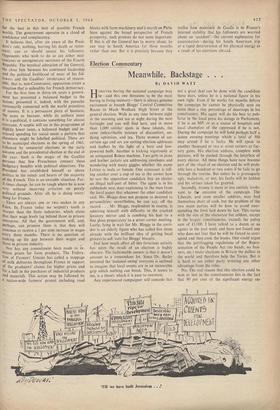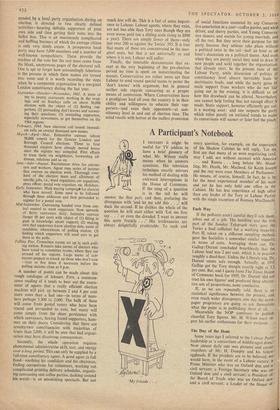Election Commentary
Meanwhile, Backstage .
By DAVID WATT
HOWEVER boring the national campaign may be—and this one threatens to be the most boring in living memory—there is always genuine. excitement at Joseph Bloggs' Central Committee Room in Much Wedlock High Street at the general election. Walk in any time between eight in the morning and ten at night during the next fortnight and you will find here, and in more than 1,000 similar spots in these islands, the same indescribable mixture of discomfort, un- dying optimism, and tea. Three women of un- certain age and sex are sorting election, addresses and leaflets by the light of a bare and low- powered bulb. Another is kicking vigorously at an antiquated Roneo machine. Two girls in jeans and leather jackets are addressing envelopes and wondering with many giggles whether the name Lettice is male or female. One canvasser is tell- ing another over a cup of tea in the corner how he saw the opposition candidate buy an elector an illegal half-pint of bitter. The agent is in his cubbyhole next door explaining to the man from the local paper that whatever the other candidate said. Mr. Bloggs does not propose to descend to personalities; nevertheless, he can say, off the record . . . Mr. Bloggs, resplendent in rosette, is admiring himself with difficulty in the cracked lavatory mirror and is combing his hair to a fine gloss preparatory to a street corner meeting. Lastly, lying in wait for Mr. Bloggs in the corri- dor is an elderly figure who has called five times already with the brilliant idea of getting local grocers to sell 'vote for Bloggs' biscuits. .
Just how much effect all this ferocious activity has upon the result of an election is highly obscure. The fashionable answer is that it doesn't amount to a tremendous lot. Since Dr. Butler invented the 'national swing' everyone is inclined to imagine that local events are in an inexorable grip which nothing can break. This, it seems to me, is a theory which it is easy to overstate.
Any experienced campaigner will concede that
not a great deal can be done with the candidate these days, unless he is a national figure in his own right. Even if he works for months before the campaign he cannot be physically seen on more than a tiny percentage of doorsteps in his constituency. His agent will do his best to pub- licise in the local press his doings in Parliament, if he is an MP, or as a visitor of hospitals and local champion of the oppressed if he is not. During the campaign he will hold perhaps half a dozen evening meetings which a total of 500 may attend if he is lucky. He will speak to another thousand or two at street corners or fac- tory gates. His election address, complete with pictures, will be pushed through the letterbox of every elector. All these things have now become part of the ritual of an election and he will prob- ably lose a hundred or two votes if he fails to go through the routine. But unless he is grotesquely ugly, maladroit, or wet, his faults will be hidden and his virtues taken for granted.
Secondly, money is more or less entirely irrele- vant to the outcome of the campaign. The Liberals, and even smaller oddities, may find themselves short of cash, but the problem of the two main parties will be how to avoid over- spending the limit laid down by law. This varies with the size of the electorate but seldom, except in the largest constituencies, exceeds the paltry sum of £1,000. I have talked to a dozen or so agents in the past week and have not found one who does not fear that he will be forced to over- spend and then cook the books. One could argue that the pettifogging regulations of the Repre- sentation of the People Act (no bands, no ban- ners, etc.) make elections in Britain the dullest in the world and therefore help the Tories. But it is hard to see either party wresting any other advantage from the rules.
No. The real reason that this election could be won or lost in the constituencies lies in the fact that 90 per cent of the significant energy ex- pended by local: party organisation during an election, is directed to two clearly defined activities—locating definite supporters of your own side and then getting their votes into the ballot box. This is ad enormously complicated and baffling business of which the average citizen is only very dimly aware. A prosperous local party may have 5,000 members and a number of well-known sympathisers. These provide the nucleus of the vote but the rest must come from the blank, anonymous pages of the electoral roll. One is apt to forget how astoundingly laborious is the process in which these names are turned into votes and it is worth recording the steps taken by a competent organisation in a marginal London constituency during the last year.
September--October—Noyember, 1963. A team of ten to twenty canvassers working in the even- ings and on Sundays calls on about 30,000 electors with the object of (1) finding sup- porters; (2) persuading don't-knows and answer- ing their questions; (3) reminding supporters, especially newcomers, to get themselves on the 1964 register.
February, 1964, New electoral roll issued. Immedi- ate calls on several thousand new names.
March—April--May. Exhaustive canvass (about 50,000 voters) for the Greater London and Borough Council elections. Three to four thousand electors have already moved house since the register was compiled. First efforts to trace them via neighbours, forwarding ad- dresses, relations and so on.
June—July—August. Recruitment drive for canvas- sers and workers. Agent runs series of instruc- tion courses on election work. Thorough over- haul of the election team and allotment of specific jobs, i.e., ward organisers, car organisers, press officer, postal vote organiser, etc. Holidays.
Early September. Main tracing campaign for electors who have moved. Some need to be followed through three addresses and then persuaded to register for a postal vote.
Mid-September. Canvassing handed over from cen- tral control to ward organisers. Now upwards
.... of thirty canvassers daily. Intensive canvass (target 90 per cent) with object of (1) filling in gaps in knowledge about support; (2) making sure that supporters know election date, name of candidate, whereabouts of polling station; (3) finding which supporters will need cars to get them to the polls.
Polling Day. Committee rooms set up in each poll- ing station. Runners take names of electors who have voted to committee rooms, where they are crossed off the register. Large teams of can- vassers prepare to knock up those who don't vote —four or five times if necessary before the polling stations close at 9 p.m.
A number of points can be made about this rough catalogue of labours. First, a common- sense reading of it tends to bear out the assess- ment of agents that a really efficient election machine will pick up between 2 and 4 per cent more votes than a bad one—in terms of num- bers perhaps 1.500 to 2,000. The bulk of these will come from postal voters who have been traced and persuaded to vote, but many will come simply from the sheer persistence with which canvassers, having found supporters, ham- mer on their doors. Considering that there are seventy-two constituencies with majorities of fewer than 2,000, it will be seen that bad organi- sation may have disastrous consequences.
Secondly, the whole operation requires phenomenal administrative skill, tact, and energy over a long period. This can only be supplied by a full-time constituency agent. A good agent in full flood—soothing his candidate and his chairman, finding occupations for volunteers, working out complicated printing delivery schedules, organis- ing canvassing and coffee parties, dashing around his wards—is an astonishing spectacle. But not
much less will do. This is a fact of some import- ance to Labour. Labour agents, where they exist, are not less able than Tory ones though they are even worse paid (on a sliding scale rising to £900 a year). There are simply fewer of them—only just over 200 as against the Tories' 595. It is true that many of these are concentrated in the mar- ginal seats, but that is not universally so and where it is not, Labour will suffer.
Finally, the timetable demonstrates that ex- cept at the very beginning of the pre-election period no time is spent on indoctrinating the masses. Conservatives are rather more apt than Labour to send round special teams to pester the 'don't knows' with argument, but in general neither side regards canvassing as a proper means of conversion. Where Conservatives have a prodigious lead all over the country is in their ability and willingness to educate their sup- porters—and even their opponents—at con- stituency level in and out of election time. The mind recoils with horror at the endless procession
of social functions mounted by any Conserve,' tive association in a year—coffee parties, and whist drives, and sherry parties, and Young Conserva- tive dances, and socials for young marrieds, and all the rest. But they serve their purpose for the party because they seldom take place without a political twist in the.tail—half an hour or an hour's discussion on a political theme. And evert when they are purely social they tend to draw in new people and weld together the organisations that already exist. In the present state of the Labour Party, while discussion of politics at' constituency level almost inevitably leads th ' doctrinaire feuds, and while the party gains its main support from workers who do not like going out in the evening, it is difficult to see how this drawback can be altered. Nevertheless, one cannot help feeling that not enough effort is made. Static support, however efficiently got out, is a wasting asset: and one suspects the party which relies purely on national trends to make its conversions will sooner or later feel the'pinch.,















































 Previous page
Previous page